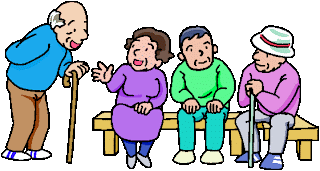Elderly group can experience a variety of mental disorders such as in the younger age groups. To identify mental problems that arise in the elderly need to do the assessment. Nursing assessment is an early stage that determines the next step to determine nursing diagnoses and planning.
Nursing assessment in psycho-geriatric clients is a complex process. Influence aspects of biological, psychological, and sociocultural due to the aging process leading to difficulties in identifying the problems that arise. Mental status assessment is a systematic approach to collect data on psychosocial functioning.
 This assessment includes: General appearance of clients, awareness, affective functions, characteristic speech, orientation, attention and concentration, judgment, memory, perception, as well as content and process of thought. This study aims to determine the thoughts and mental processes that affect the achievement of optimal levels of functioning elderly. This assessment is integrated in the interview and physical examination.
This assessment includes: General appearance of clients, awareness, affective functions, characteristic speech, orientation, attention and concentration, judgment, memory, perception, as well as content and process of thought. This study aims to determine the thoughts and mental processes that affect the achievement of optimal levels of functioning elderly. This assessment is integrated in the interview and physical examination.Assessment of Mental Status in Elderly
General appearance
General appearance, can provide a picture of psychological functioning. General appearance, including: physical appearance, coordination of movement, facial expression and posture. Physical appearance include: how to dress, care and personal hygiene.
Observations can be done to assess the general appearance:
- Is the client's physical appearance indicates a psychological dysfunction?
- Does gait, posture and facial expressions indicate a psychological disorder?
- Are there signs of tardive dyskineksia or unfavorable effects caused by medication?
Awareness
Awareness is the ability of individuals to make contact with their environment and with oneself (through the five senses). When the consciousness of both (not decrease) the orientation capabilities such as time, place and people will be fine and able to process incoming information effectively (through memory and judgment). In assessing the level of awareness needs to be considered:
- effect of medication
- affective disorder
- pathologic conditions
- Is the level of awareness of current clients?
- Are there fluctuations in the level of awareness of the client. If there is any particular pattern?
- Are there physical factors that affect the level of consciousness, ie the influence of medication, pathologic conditions, and affective disorders?
- Are there psychosocial factors that influence the level of awareness such as: anxiety, depression, or sleep disorders?
Affective Functions
Things that need to be considered in assessing an affective function in the elderly are:
- Important to assess the significance of an event for the elderly to assess the depth and duration affect the displayed
- Emotional expression is influenced by cultural and personal characteristics
- In the elderly usually do not express their feelings directly / verbally. Therefore it is important to observe iti the reaction of indirect / non-verbal of the elderly.
- Important to use terms that are acceptable to the elderly at the time of the interview by focusing on the feelings felt by the elderly. Can be initiated by using the open ended question such as: how is he today?
- How do you feel current clients?
- Are the indicators that describe the mood / anxiety / depression on the client?
- Are there any factors that cause anxiety following on the client such as pathological conditions, treatments or interventions that affect the central nervous system?
- How that is done by the client to cope with feelings that are not as usual?
- Are there things you want to discuss about the client's feelings?
Characteristics of speech
Characteristics of speech include: understanding, articulation, pauses, quality, quantity and coherent. Cultural factors may affect the characteristics of speech.
Observation to study the characteristics of the speech:
- Is the client able to answer according to questions asked?
- Does normal speech pause, slow or fast?
- Is the tone of voice to show certain feelings such as anger, resentment, sadness, despair, etc.?
- Does the voice sound soft or hard?
- Is adal articulation difficulties?
- Are the sentences pronounced coherent elderly?
- Is there the following factors that may affect the characteristics of speech such as: dry mouth, toothless, the effects of medication or alcohol?
- Are there signs of agnosia, aphasia, or word repetition?
Orientation
The orientation includes orientation to place, person and time.
Interviews to assess client orientation:
- People: Who are your name, What was the name of your child? What was the name my husband / wife?, Etc.
- Time: What time is it? , When should you eat breakfast? What day is it? , Boast what now? , etc.
- Place: Where may you now? , Where is your address? What is the name of this town? , What is the name of this place? etc.
Attention and Concentration
Nurses must observe and record the response shown by the elderly at the time of assessment, when answering questions.
Observations to assess attention and concentration:
- What about client behavior during the interview?
- Whether clients eager to answer questions?
- If it does not answer the question or the answer given is incorrect because it is not capable, cultural factors or lack of motivation?
- Is there a signs of anger, resentment, sadness, despair, etc.?
Memory
The memory includes a new memory, short-term memory and long-term memory. Memory impairment can identify any impairment of intellectual / cognitive. The Short Portable Mental Status Quesionnaire (SPMQ) is used to detect the level of intellectual impairment.
Pereption
Perception is the power to know things, qualities, relations and differences through a process to observe, learn and interpret the following senses get stimulated.